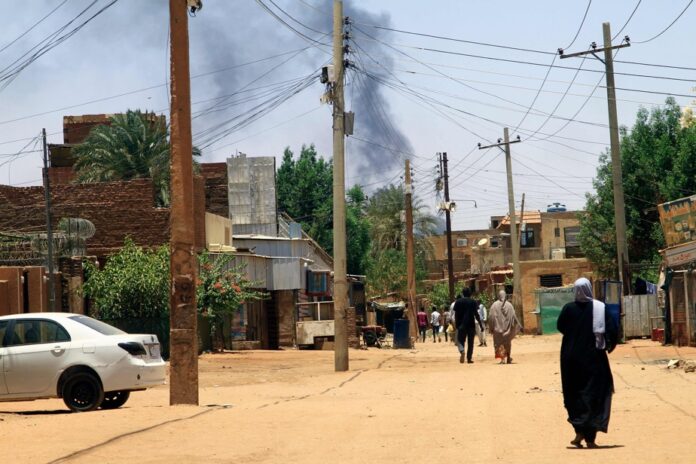(Khartoum) Thousands of civilians flee Khartoum under bombardment on Wednesday as fighting between the paramilitaries of the Rapid Support Forces (RSF) and the regular army left nearly 200 dead in Sudan in four days.
On foot or by car, on roads strewn with corpses and charred armored vehicles, thousands of Sudanese try to pass under the crossfire of the FSR of General Mohamed Hamdane Daglo, known as “ Hemedti ”, and the army led by the general Abdel Fattah al-Burhane, in charge since their joint coup in 2021.
The two men, engaged in a struggle now “ existential ” according to experts, remain deaf to the incessant calls for a ceasefire, even temporary, to evacuate civilians.
Despite everything, clusters of families have been able to flee since the start of hostilities on Saturday, taking advantage of brief lulls, most often the time for fighters to reload ammunition or move a few streets.
Because in the capital of more than five million inhabitants, life is no longer tenable: electricity and running water have disappeared, and only return in some places for a few hours, and stray bullets regularly pierce a wall or a window. Worse, sometimes a bomb from the sky reduces a building or a hospital to a pile of rubble.
Already Monday evening, the UN counted nearly 200 dead, more than 1,800 wounded, and all the doctors repeat it, no assessment is reliable as the battlefield is dangerous: many dead and wounded have not yet been found.
Air force and artillery from both sides shelled nine hospitals in Khartoum. In all, 39 out of 59 hospitals in the areas affected by the fighting have been disabled or forced to close, doctors report: because they ran out of equipment, because fighters were occupying them or because caregivers, taken under fire, had not been able to take up their post.
As for food stocks, already limited in a country with triple-digit inflation, they are only dwindling and no more supply trucks have entered Khartoum since Saturday.
In a country of 45 million people where hunger affects more than a third of the population, humanitarians and diplomats say they can no longer work: three employees of the World Food Program (WFP) were killed in Darfur (west) and l UN denounces “looting, attacks and sexual violence against humanitarian workers”.
The inhabitants live in anguish of an attack on their house or their family: they have not forgotten the battles, raids and other atrocities which earned dictator Omar al-Bashir (deposed in 2019) two arrest warrants for “ war crimes ”, “ crimes against humanity ” and “ genocide ” in Darfur. At the time, he had delegated the scorched earth policy to one man: Hemedti.
So on Wednesday, thousands of women and children took the road to the provinces bordering Khartoum, progressing among corpses from which pestilential odors were beginning to emerge, witnesses report.
For the chancelleries on the spot, the task is complicated by attacks: an American diplomatic convoy came under fire on Monday, the ambassador of the European Union was “ attacked in his residence ” in Khartoum and the Belgian boss of the humanitarian mission from the EU was “ hospitalized ” after being shot.
But they claim to try to organize transport for their nationals, even if the prospect of evacuations could still be remote, the airport of Khartoum being out of service.
In four days of air raids and clashes, neither the army nor the paramilitaries have the upper hand.
In Khartoum, it is impossible to know who controls what, as the confusion is total and the online misinformation gallops.
Satellite images, however, show the extent of the damage, visible in particular inside the very bunkered HQ of the general staff protected by high walls.
A dozen planes lie in ashes on the tarmac of the airport, the headquarters of general information appears devastated, what was a depot for gasoline tankers is now just a huge black stain…
“ Neither side seems to be winning at the moment and given the intensity of the fighting […], things could get even worse before the two generals sit down at the negotiating table ”, warns Clément Deshayes, teacher at the Paris 1 University.
For this, “their regional partners would have to exert pressure and for the moment the declarations do not go in this direction,” the Sudan specialist told AFP.
The acting powers try to spare the two generals. Because they do not want to insult the future, which is still very uncertain, assure the experts.


















